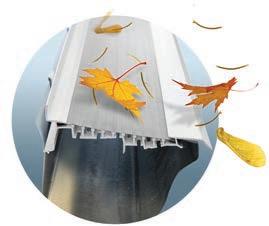
5 minute read
How to defer payment on rising property tax bill
Here is how to do it
BY JESSE PAUL THE COLORADO SUN
Many Coloradans’ property tax bills are spiking because of rising home values across the state, but there is a way to put o a big hit to your wallet happening all at once.
e legislature passed a measure in 2021 aiming to ease the nancial burden by letting people defer payment on some of what they owe on their primary residence, starting in the 2023 tax year. e state-run program may not be appropriate for everyone, however, and there are some key details about the deferral you should know about before deciding whether to apply.
Here’s how the initiative, housed in the Colorado Treasurer’s O ce, works, how to sign up and why you may want to think twice before taking advantage of the option: e deferral was made possible by the passage of Senate Bill 293 in 2021, a bipartisan measure brought in response to rapidly increasing property tax bills. e bill lets residential property owners defer any increase in their annual property tax bill that’s 4% above the average they paid over the previous two years as long as the increase is above $100. Property owners can defer up to $10,000 total over multiple years.
How does it work?
You aren’t o the hook forever. e deferral becomes a lien against the property that’s subject to interest and must be paid o when the home is sold. e idea is to let homeowners use their unrealized property value gains to eventually cover their increased tax burden.
Property taxes are complicated, but the Colorado Treasurer’s O ce has a quick and easy (seriously, it’s very easy) way to gure out if your property tax bill has increased above 4% and how much money you are eligible to defer in a given tax year.
Here’s a link to the site to check if your property is eligible: http://colorado.propertytaxdeferral.com/
Unless you are a senior citizen or active military member (more on that below), scroll to the “TAX GROWTH CAP” section and hit “check eligibility.” You’ll need to enter in some basic information, but the property tax information for your home should populate automatically.
Join St.
You’ll have to a rm that your home is owner occupied, not income producing, has no delinquent property taxes and that you have a “lawful presence in the United States.” ere is no end-date for the deferral program, which means you can apply year after year if you’re eligible. However, there is a chance the legislature could decide at some point to limit how many people can apply each year. at means the legislature needs enough money to back ll counties and unlike Congress, the General Assembly can’t simply print money. If there are too many applicants, the legislature could decide to impose a cap.
You have until April 1 to apply for the deferral.
When does the relief run out?
Property tax revenue is collected by counties and distributed to local government entities, like school and re districts, which rely on the money to operate. Under the deferral program, the General Assembly shoulders the deferred property tax payments by sending counties the di erence between what they’re owed and what a property owner is deferring.
Colorado Treasurer Dave Young, a Democrat, said right now his o ce and the legislature are expecting about 35,000 deferrals each year. Young, a former state representative who helped write Colorado’s budget, said if there are more than 35,000 deferrals the legislature may have to take a hard look at reshaping the program.
“I think we’re going to see how the economy is going and how people feel they need to utilize the program,” he said. “We may need to make adjustments. No one really knows (how much interest there is going to be) because we’ve never done this before.” e annual interest rate you are responsible for paying on your deferral is based on the 10-year Treasury yield and it’s locked in at the time of your application.
Does the deferral accrue interest?
Yes.
Martin’s Chamber Choir for an Amazing Performance!
Born the same year as Beethoven, Christian Heinrich Rinck (1770-1846) was best known as an organist and composer of sacred works (his teacher was a student of Bach). His rarely-performed Requiem for 4-part men’s choir and organ is a richly textured and deeply touching work. Also on the program will be the premiere of a new work commissioned by St. Martin’s Chamber Choir for the occasion by American composer Ross Jallo.

Friday, March 3, 7:30 pm
First Plymouth Congregational Church Cherry Hills Village
Sunday, March 5, 3:00 pm St. Andrew’s Episcopal Church, Denver stmartinschamberchoir.org
For reference, the rate Wednesday morning was 3.55%. You are not responsible for paying the accrued interest until the lien is paid o .
“It’s simple interest,” Young said, “not compound.” at means that you pay the interest rate on the original deferral amount, not the deferral amount plus the interest you pay each year on top of that. In other words, if you defer $800 in property tax payments for a given year, you owe $28 in interest each year under the 3.55% treasury rate. You wouldn’t pay interest on $828 in the second year, and so on and so forth.
If you apply for deferrals in multiple years, the interest rate will change from year to year based on when you apply. e 10-year Treasury rate is high right now because of federal monetary policy aimed at tamping down in ation. It’s likely to be lower in future years.
Can I pay my lien o early to avoid more interest?
Yes, Colorado homeowners don’t have to wait until they sell their property to pay o the lien.
And it may make nancial sense to pay back the lien as soon as possible. If you pay back the lien early, you can avoid accruing more interest.
“It’s really up to the person to decide what their nances can handle,” Young said.
How are property taxes calculated?
Property taxes are determined by how much your county assessor values your property, what the state’s property assessment rate is and what your local mill-levy rate is.
A mill is a $1 payment on every $1,000 of assessed value.
at’s something every homeowner must decide for themselves. ere could be real estate consequences for having a lien on your home, and if you have a mortgage, you may want to talk to your lender before applying for a deferral.
“ is is a safety valve,” Young said. “I don’t think it’s the right thing for everybody. I think people should go in and take a good hard look at it and say ‘does this make sense for us?’” is story is from e Colorado Sun, a journalist-owned news outlet based in Denver and covering the state. For more, and to support e Colorado Sun, visit coloradosun.com. e Colorado Sun is a partner in the Colorado News Conservancy, owner of Colorado Community Media.
Young said the deferral program is really meant for people making hard choices in their budget.
“We don’t want somebody to lose their home because they can’t make a mortgage payment,” he said.
You should also know that the state will ask you for some personal nancial information, mainly about your debt situation, before approving a deferral.
How does the deferral work with my mortgage?
Many people pay their property taxes through escrow collected by their mortgage lender. e Treasurer’s O ce says your lender should be noti ed if you get a deferral and adjust your mortgage payments appropriately.
Again, you may want to discuss the deferral program with your lender before you apply.
Seniors and members of the military are eligible for a bigger deferral Coloradans 65 and older can defer all of the increase in their property taxes on their primary residence, as can active military members. at’s not new, but Coloradans may not be aware of the option because it hasn’t been well publicized.
For information on eligibility and how to apply, visit https://colorado. propertytaxdeferral.com/home.











